#Sydette Harry
Explore tagged Tumblr posts
Text
Once again...Black users (and a great deal of those Black users Black trans women) as well as sex workers are the canaries in the coal mine. Because there was a sweeping disappearance of Black blogs orchestrated by the site and officially justified by "Russian interference" (as in those Black bloggers were conveniently branded as bots). Even though the little bit of Russian interference there was showed up under the form of organized white supremacists. Then the FESTA-SOSTA bill came along, a bill that should have gotten the same attention than KOSA, because it opened the floodgates and was largely responsible for the erasure of sex workers on Tumblr and the fight against any type of nudity, at the same time there is an increase of porn bots and non consensually taken nudes and other videos. It took years of escalation for a lawsuit to be filed, when if all of Tumblr, as in, its user base, had congealed around the disappearance of Black blogs, maybe we would be nowhere near those vicious catastrophes. A lot of the Black users exterminated...were Black cis women and Black trans women. The pattern has been very clear on Twitter, it's now happening in Tumblr in different ways. Once again canaries in the coal mine and all...

ID [Tweet by @Blackamazon. Dated May 22, 2021
Everyone is shocked that the attacks are more blatant and things are worse.
But you treated everyone who said it was going to get this bad
Terribly
And in public
People went out their way to show "the canaries in the coal mine"
didn't matter] End of ID
2K notes
·
View notes
Text

ID |Twitter handle: BlackAmazon aka Sydette Harry
And people love the manipulation argument, newly "All Black folks are bots" also shared by Black bourgeoisie and fake radicals who jazz it up by combining it with dismissing actual applied experience to his academic privilege.
To justify the sloppy scholarship that led us here"] end of ID

ID [Because please note Jill and many white liberals especially those whose platforms are based on movements, and social history Tend to run to the argument of "Black people are bots/manipulated"
EVEN ABOUT BLACK PEOPLE WHO AGREE WITH THEM] end of ID
I feel like the psyops are back…
#stories from the void#I'm tired#so I'm going to let Sydette Harry take it up from there#and if any of you people want to ask her credentials#GOOGLE HER#Even with how bad Google is#She has earned the right to say everything she says#with her very flesh
37K notes
·
View notes
Text
Yet Another Thing Black women and BIPOC women in general have been warning you about since forever that you (general You; societal You; mostly WytFolk You) have ignored or dismissed, only for it to come back and bite you in the butt.
I'd hoped people would have learned their lesson with Trump and the Alt-Right (remember, Black women in particular warned y'all that attacks on us by brigading trolls was the test run for something bigger), but I guess not.
Any time you wanna get upset about how AI is ruining things for artists or writers or workers at this job or that, remember that BIPOC Women Warned You and then go listen extra hard to the BIPOC women in your orbit and tell other people to listen to BIPOC women and also give BIPOC women money.
I'm not gonna sugarcoat it.
Give them money via PayPal or Ko-fi or Venmo or Patreon or whatever. Hire them. Suggest them for that creative project/gig you can't take on--or you could take it on but how about you toss the ball to someone who isn't always asked?
Oh, and stop asking BIPOC women to save us all. Because, as you see, we tried that already. We gave you the roadmap on how to do it yourselves. Now? We're tired.
Of the trolls, the alt-right, the colonizers, the tech bros, the billionaires, the other scum... and also you. You who claim to be progressive, claim to be an ally, spend your time talking about what sucks without doing one dang thing to boost the signal, make a change in your community (online or offline), or take even the shortest turn standing on the front lines and challenging all that human garbage that keeps collecting in the corners of every space with more than 10 inhabitants.
We Told You. Octavia Butler Told You. Audre Lorde Told You. Sydette Harry Told You. Mikki Kendall Told You. Timnit Gebru Told You.
When are you gonna listen?
#tw: alt-right#tw: alt right#AI#generative AI#LLM#large language models#GamerGate#online harassment#Black women#BIPOC#women of color
548 notes
·
View notes
Text
please donate if you can, repost/share if you can't! sydette harry (blackamazon) has done so much important internet research and critique for us 'users,’ and most of her work is unacknowledged and unpaid. support her!!
2 notes
·
View notes
Photo

Decoding Black Characters: Pitch’s Ginny Baker
This post was inspired by a recent thread by Sydette Harry on twitter. Before we get into that, for those unfamiliar Ginny Baker, played by actress and model Kylie Bunbury, was the main character of a recently canceled Fox tv drama called Pitch. Ginny Baker is a young woman thrown into the spotlight when she becomes the first woman to ever be drafted to a Major League Baseball team. The first, and only, season follows Ginny as we learn about her past, her friends and her family. As Harry points out, Ginny is often struggling with reconciling her personal identity and humanity with the “baseball robot” she has to become in her public persona.
As the show progresses it seems that more and more often her happiness and mental health are at odds with building her brand and career because she is not allowed to display the amount of labor that goes into making her a star and a role model. Sydette suggests that it is no coincidence that Pitch got canceled because they revealed too much about how systems treat black people. Ginny was a symbol, a fully developed character that broke the image of an obedient black robot that did as the establishment told them to. With Harry’s words in mind, this post is meant to be a sort of celebration and appreciation of Ginny Baker and everything that her unfinished narrative meant. That use of imagery is also historically relevant since the concept of robots and automatons and the fear that they will disobey their masters originated in the fear that African slaves would realize their own humanity and rise up against their white owners.
By going in depth into Ginny Baker’s personal life and witnessing first hand how much she struggled to live up to or exceed everyone’s expectations, it could be said that black women in general were humanized. While most of us are not the first woman to join Major League Baseball, we have all had to deal with high expectations from our loved ones or low expectations from people operating on prejudice and misogynoir. Like Ginny, we fight for the space to just exist and be for our own sakes as we determine what we want our roles to be in the world. The idea of being a Strong Independent Black Woman is a burden that justifies denying care and tenderness when black women need it most and it’s truly a shame that Pitch was canceled just when it had just gotten started on breaking down that stereotype and shining a light on the pressure on black women to perform.
#decoding black characters#c: ginny baker#title: pitch#black code studies#sydette harry#writer: Channing Kimble-Brown
3 notes
·
View notes
Link
via Instapaper: Unread
0 notes
Link
Adore or despise them, GIFs are integral to the social experience of the Internet. Thanks to a range of buttons, apps, and keyboards, saying “it me” without words is easier than ever. But even a casual observer of GIFing would notice that, as with much of online culture, black people appear at the center of it all. Or images of black people, at least. The Real Housewives of Atlanta, Oprah, Whitney Houston, Mariah Carey, NBA players, Tiffany Pollard, Kid Fury, and many, many other known and anonymous black likenesses dominate day-to-day feeds, even outside online black communities. Similar to the idea that “Black Vine is simply Vine,” as Jeff Ihaza determined in The Awl, black reaction GIFs have become so widespread that they’ve practically become synonymous with just reaction GIFs.
If you’ve never heard of the term before, “digital blackface” is used to describe various types of minstrel performance that become available in cyberspace. Blackface minstrelsy is a theatrical tradition dating back to the early 19th century, in which performers “blacken” themselves up with costume and behaviors to act as black caricatures. The performances put society’s most racist sensibilities on display and in turn fed them back to audiences to intensify these feelings and disperse them across culture. Many of our most beloved entertainment genres owe at least part of themselves to the minstrel stage, including vaudeville, film, and cartoons. While often associated with Jim Crow–era racism, the tenets of minstrel performance remain alive today in television, movies, music and, in its most advanced iteration, on the Internet.
Unlike other physical executions of blackface (such as by Robert Downey Jr. in Tropic Thunder, Sarah Silverman on her own show, Rachel Dolezal, or the authors of AB to Jay-Z) that require physical alternations and usually a change in demeanor (like Iggy Azalea’s “blaccent”), digital blackface is in some ways a more seamless transformation. Digital blackface uses the relative anonymity of online identity to embody blackness. In the case of Mandi Harrington, a white woman who masqueraded as the fictional “LaQueeta Jones,” digital blackface became a means for her to defend musician Ani DiFranco’s decision to host a retreat at a slave plantation. Digital minstrels often operate under stolen profile pictures and butchered AAVE. Quite often it comes in the form of an excessive use of reaction GIFs with images of black people.
After all, the emotional range these GIFs cover is quite large. Reaction GIFs are generally reserved for oddly specific yet also universal situations that we all can relate to: grabbing a snack to watch some drama unfold with MJ; witnessing an awkward encounter with Hov; walking into a garbage fire with Donald Glover; walking away from one with Angela Bassett; sipping with Wendy, Prince, or Bey; or delivering the shadiest side-eye imaginable with Viola Davis, Rihanna, James Harden, Tamar, Naomi Campbell, and truly too many other folks to name. The so-called “greatest meme of 2016,” at least according to BuzzFeed, featured rapper Conceited in the now-iconic GIF where he purses his lips and turns toward the camera with a red solo cup in hand.
Outside these cherry-picked, celeb-studded examples are countless reaction images of small sensations like Tanisha from Bad Girls Club and Ms. Foxy from Beyond Scared Straight, or relative unknowns, pulled from news coverage, YouTube, and Vines. These are the kind of GIFs liable to come up with a generic search like “funny black kid gif” or “black lady gif.” For the latter search, Giphy offers several additional suggestions, such as “Sassy Black Lady,” “Angry Black Lady,” and “Black Fat Lady” to assist users in narrowing down their search. While on Giphy, for one, none of these keywords turns up exclusively black women in the results, the pairings offer a peek into user expectations. For while reaction GIFs can and do every feeling under the sun, white and nonblack users seem to especially prefer GIFs with black people when it comes to emitting their most exaggerated emotions. Extreme joy, annoyance, anger and occasions for drama and gossip are a magnet for images of black people, especially black femmes.
Now, I'm not suggesting that white and nonblack people refrain from ever circulating a black person’s image for amusement or otherwise (except maybe lynching photos, Emmett Till’s casket, and videos of cops killing us, y’all can stop cycling those, thanks). There’s no prescriptive or proscriptive step-by-step rulebook to follow, nobody’s coming to take GIFs away. But no digital behavior exists in a deracialized vacuum. We all need to be cognizant of what we share, how we share, and to what extent that sharing dramatizes preexisting racial formulas inherited from “real life.” The Internet isn’t a fantasy — it’s real life.
After all, our culture frequently associates black people with excessive behaviors, regardless of the behavior at hand. Black women will often be accused of yelling when we haven’t so much as raised our voice. Officer Darren Wilson perceived a teenage Michael Brown as a hulking “demon”and a young black girl who remained still was flipped and dragged across a classroom by deputy Ben Fields. It's an implication that points toward a strange way of thinking: When we do nothing, we’re doing something, and when we do anything, our behavior is considered "extreme." This includes displays of emotion stereotyped as excessive: so happy, so sassy, so ghetto, so loud. In television and film, our dial is on 10 all the time — rarely are black characters afforded subtle traits or feelings. Scholar Sianne Ngai uses the word “animatedness” to describe our cultural propensity see black people as walking hyperbole.
If there’s one thing the Internet thrives on, it’s hyperbole and the overrepresentation of black people in GIFing everyone’s daily crises plays up enduring perceptions and stereotypes about black expression. And when nonblack users flock to these images, they are playacting within those stereotypes in a manner reminiscent of an unsavory American tradition. Reaction GIFs are mostly frivolous and fun. But when black people are the go-to choice for nonblack users to act out their most hyperbolic emotions, do reaction GIFs become “digital blackface”?
Then comes the more sinister side of this. Similar cases happen all over the comments section virtually anywhere, with or without a photo, often prefaced with statements like “as a black man…” before proceeding to sound like anything but. In other instances, digital blackface is an orchestrated attempt by white supremacists to disrupt black organizing. Writer Shafiqah Hudsonstarted the hashtag #yourslipisshowing to document instances of digital blackface in real time, joined by other black women writers and theorists such as I’Nasah Crockett, Sydette Harry, Mikki Kendall, Trudy, and Feminista Jones. As the name of the tag suggests, online minstrels are no more believable than their in-person counterparts to anyone who knows black culture and black people, rather than a series of types. Unfortunately, digital blackface often goes unchecked unless a black person does the work to point out the discrepancies in someone’s profile.
But while these examples are particularly noteworthy for their malicious intent, digital blackface has softer counterparts, just like offline blackface. Digital blackface does not describe intent, but an act — the act of inhabiting a black persona. Employing digital technology to co-opt a perceived cache or black cool, too, involves playacting blackness in a minstrel-like tradition. This can be as elaborate as anon accounts like @ItsLaQueefa or as inadvertent as recruiting images of black queer men to throw shade at one’s enemies. No matter how brief the performance or playful the intent, summoning black images to play types means pirouetting on over 150 years of American blackface tradition.
Images of black people, more than anyone else, are primed to go viral and circulate widely online — in trauma, in death, and in memes. Reaction GIFs are an uneasy reminder of the way our presence is extra visible in life, every day, in ways that get us profiled, harassed, mocked, beaten, and killed. Long before the Internet or television, merry racist characters like pickaninnies and coons circulated the same social space as lynching postcards. Being on display has always been a precarious experience for black folks. Scholars such as Tina Campt and artists like Martine Syms consider what it means for black images to be reproduced as stock visuals in history and culture. “Representation is a sort of surveillance,” Syms recently told The New Yorker. Reaction GIFing looks less innocuous with the consideration of how overrepresented images of black people have become within the practice.
“[T]o be looped in a GIF, to be put on display as ‘animated’ at the behest of audiences,” as Monica Torres describes for Real Life, is an act with racial history and meaning. These GIFs often enact fantasies of black women as “sassy” and extravagant, allowing nonblack users to harness and inhabit these images as an extension of themselves. GIFs with transcripts become an opportunity for those not fluent in black vernacular to safely use the language, such as in the many “hell to the no,” “girl, bye,” and “bitch, please” memes passed around. Ultimately, black people and black images are thus relied upon to perform a huge amount of emotional labor online on behalf of nonblack users. We are your sass, your nonchalance, your fury, your delight, your annoyance, your happy dance, your diva, your shade, your “yaas” moments. The weight of reaction GIFing, period, rests on our shoulders. Intertwine this proliferation of our images with the other ones we’re as likely to see — death, looped over and over — and the Internet becomes an exhausting experience.
If you find yourself always reaching for a black face to release your inner sass monster, maybe consider going the extra country mile and pick this nice Taylor Swift GIF instead.
0 notes
Photo

We all are sis, we all are 😢👏👏 #Repost @philaprint ・・・ 🗣: Sydette Harry
0 notes
Text
We lost Shafiqa Hudson. You might not know who she is but this is an unforgivable loss. This might even be called a murder in many ways. And the fact that this happened during BHM is...
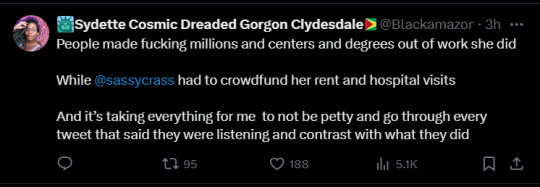
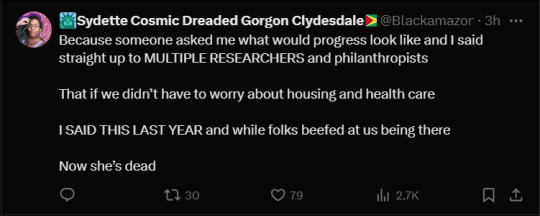
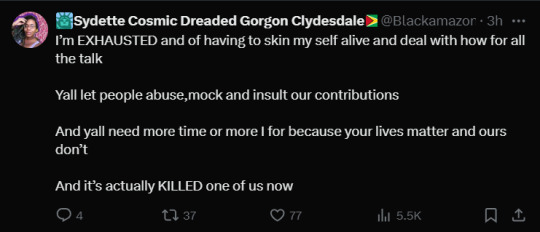
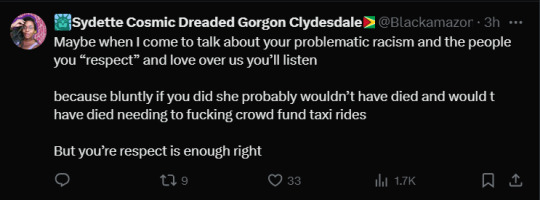
This is an article by Sydette Harry, the tweeter above, that gives a sliver of context as to who Shafiqah Hudson was and why I, along so many, know her name.
606 notes
·
View notes
Text
Big City Stories, August 27, 2014 Storyteller: Sydette Harry
0 notes
Link
Sydette Harry offers some advice to a reader: This person is poison.
1 note
·
View note
Text

ID [ Twitter @Blackamazon Dated: January, 13, 2016 Antiblackness isn't just "IHATE NIGRAS!!!" It's also "No one is responsible for what happens to black people"] End of ID
108 notes
·
View notes
Text
A lot of Black people on this platform basically embody the screenshot I'm going to post below:
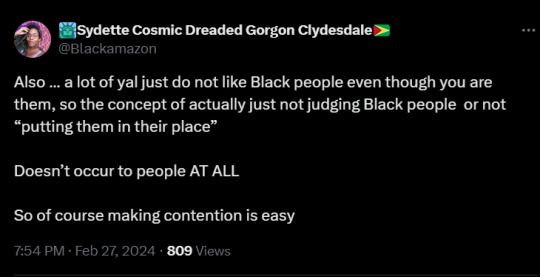
ID [ Twitter handle Blackamazon. Dated Feb 27th.
Also...a lot of yal just do not like Black people even though you are them, so the concept of actually just not judging Black people or "putting them in their place"
Doesn't occur to people AT ALL
So of course making contention is easy] end of ID

16 notes
·
View notes
Text



"Sometimes we should avoid psychoanalytical language" (okay I made one mistake, one mistake...and you're right)

19 notes
·
View notes

